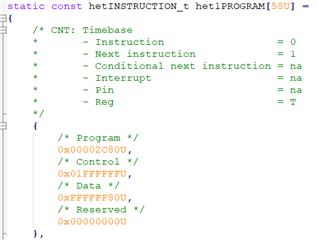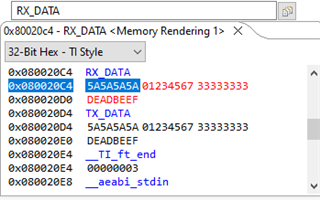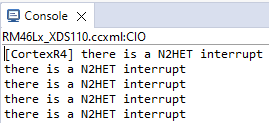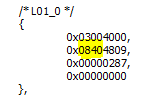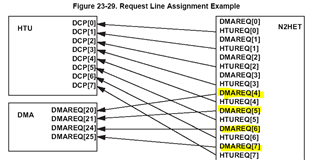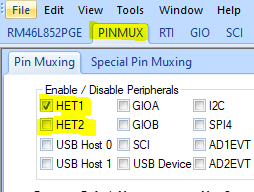Other Parts Discussed in Thread: HALCOGEN
I'm having a problem configurating a DMA REQ through the N2HET.
My het code generates a PWM and when the compare matches de pwm goes up and generates de Request. I'm trying to redirect the data to the first 8 pins of HET1 and can't seem to figure it out.
Can someone help?
Here is the main code with all the drivers from HalCoGen.
Appreciated,
Nuno Olive
/** @file sys_main.c
* @brief Application main file
* @date 11-Dec-2018
* @version 04.07.01
*
* This file contains an empty main function,
* which can be used for the application.
*/
/*
* Copyright (C) 2009-2018 Texas Instruments Incorporated - www.ti.com
*
*
* Redistribution and use in source and binary forms, with or without
* modification, are permitted provided that the following conditions
* are met:
*
* Redistributions of source code must retain the above copyright
* notice, this list of conditions and the following disclaimer.
*
* Redistributions in binary form must reproduce the above copyright
* notice, this list of conditions and the following disclaimer in the
* documentation and/or other materials provided with the
* distribution.
*
* Neither the name of Texas Instruments Incorporated nor the names of
* its contributors may be used to endorse or promote products derived
* from this software without specific prior written permission.
*
* THIS SOFTWARE IS PROVIDED BY THE COPYRIGHT HOLDERS AND CONTRIBUTORS
* "AS IS" AND ANY EXPRESS OR IMPLIED WARRANTIES, INCLUDING, BUT NOT
* LIMITED TO, THE IMPLIED WARRANTIES OF MERCHANTABILITY AND FITNESS FOR
* A PARTICULAR PURPOSE ARE DISCLAIMED. IN NO EVENT SHALL THE COPYRIGHT
* OWNER OR CONTRIBUTORS BE LIABLE FOR ANY DIRECT, INDIRECT, INCIDENTAL,
* SPECIAL, EXEMPLARY, OR CONSEQUENTIAL DAMAGES (INCLUDING, BUT NOT
* LIMITED TO, PROCUREMENT OF SUBSTITUTE GOODS OR SERVICES; LOSS OF USE,
* DATA, OR PROFITS; OR BUSINESS INTERRUPTION) HOWEVER CAUSED AND ON ANY
* THEORY OF LIABILITY, WHETHER IN CONTRACT, STRICT LIABILITY, OR TORT
* (INCLUDING NEGLIGENCE OR OTHERWISE) ARISING IN ANY WAY OUT OF THE USE
* OF THIS SOFTWARE, EVEN IF ADVISED OF THE POSSIBILITY OF SUCH DAMAGE.
*
*/
/* USER CODE BEGIN (0) */
#include "het.h"
#include "mibspi.h"
#include "sys_dma.h"
#include "gio.h"
#include "PWM.h"
/* USER CODE END */
/* Include Files */
#include "sys_common.h"
/* USER CODE BEGIN (1) */
/* USER CODE END */
/** @fn void main(void)
* @brief Application main function
* @note This function is empty by default.
*
* This function is called after startup.
* The user can use this function to implement the application.
*/
/* USER CODE BEGIN (2) */
#define D_SIZE 2
void dmaConfigCtrlPacket(uint32 sadd,uint32 dadd,uint32 dsize);
void mibspiDmaConfig(mibspiBASE_t *mibspi,uint32 channel, uint32 txchannel, uint32 rxchannel);
uint8 TX_DATA[D_SIZE] = {1<<6,0x0} ; /* transmit buffer in sys ram */
static uint8 *reg_out; //output register
g_dmaCTRL g_dmaCTRLPKT; /* dma control packet configuration stack */
/* USER CODE END */
uint8 emacAddress[6U] = {0xFFU, 0xFFU, 0xFFU, 0xFFU, 0xFFU, 0xFFU};
uint32 emacPhyAddress = 0U;
int main(void)
{
/* USER CODE BEGIN (3) */
hetInit();
reg_out = &((uint8_t *) &(hetREG1->DOUT))[0];
hetREG1->REQDS = 1<<4;
/* - assigning dma request: channel-0 with request line - 1 */
dmaReqAssign(4,20 );
/* - configuring dma control packets */
dmaConfigCtrlPacket((uint32)(&TX_DATA),(uint32)reg_out,D_SIZE);
/* upto 32 control packets are supported. */
/* - setting dma control packets */
dmaSetCtrlPacket(DMA_CH4,g_dmaCTRLPKT);
/* - setting the dma channel to trigger on h/w request */
dmaSetChEnable(DMA_CH4, DMA_HW);
/* - enabling dma module */
dmaEnable();
while(1)
{
}
/* USER CODE END */
}
/* USER CODE BEGIN (4) */
/** void dmaConfigCtrlPacket(uint32 sadd,uint32 dadd,uint32 dsize)
*
* configuring dma control packet stack
*
* sadd > source address
* dadd > destination address
* dsize > data size
*
* @ note : after configuring the stack the control packet needs to be set by calling dmaSetCtrlPacket()
*/
void dmaConfigCtrlPacket(uint32 sadd,uint32 dadd,uint32 dsize)
{
g_dmaCTRLPKT.SADD = sadd; /* source address */
g_dmaCTRLPKT.DADD = dadd; /* destination address */
g_dmaCTRLPKT.CHCTRL = 0; /* channel control */
g_dmaCTRLPKT.FRCNT = 1; /* frame count */
g_dmaCTRLPKT.ELCNT = dsize; /* element count */
g_dmaCTRLPKT.ELDOFFSET = 4; /* element destination offset */
g_dmaCTRLPKT.ELSOFFSET = 0; /* element destination offset */
g_dmaCTRLPKT.FRDOFFSET = 0; /* frame destination offset */
g_dmaCTRLPKT.FRSOFFSET = 0; /* frame destination offset */
g_dmaCTRLPKT.PORTASGN = 4; /* port b */
g_dmaCTRLPKT.RDSIZE = ACCESS_16_BIT; /* read size */
g_dmaCTRLPKT.WRSIZE = ACCESS_16_BIT; /* write size */
g_dmaCTRLPKT.TTYPE = FRAME_TRANSFER ; /* transfer type */
g_dmaCTRLPKT.ADDMODERD = ADDR_INC1; /* address mode read */
g_dmaCTRLPKT.ADDMODEWR = ADDR_OFFSET; /* address mode write */
g_dmaCTRLPKT.AUTOINIT = AUTOINIT_ON; /* autoinit */
}
/* USER CODE END */
ira



